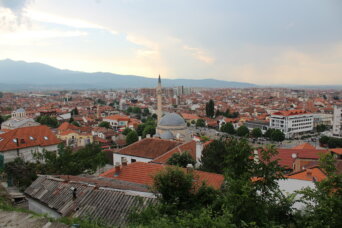- About
- Topics
- Picks
- Audio
- Story
- In-Depth
- Opinion
- News
- Donate
- Signup for our newsletterOur Editors' Best Picks.Send
Read, Debate: Engage.
| topic: | Peace and Reconciliation |
|---|---|
| located: | Serbia, Bosnia and Herzegovina, Montenegro, Kosovo, Slovenia, Croatia |
| editor: | Katarina Panić |
The European Union surrounds the Western Balkans. Still, it is unlikely that the five aspiring states will become members of the bloc this decade.
Slovenia entered the EU in 2004 and Croatia in 2013, and no other country has joined in since. Bosnia, Kosovo, Montenegro, North Macedonia and Serbia are still in the waiting room.
In the meantime, one country had left, and Brexit marked a historical and rather traumatic experience for both the UK and the EU.
Last month, two alleged non-papers, revealed by media outlets in Slovenia and Kosovo, shook the region. One redraws the borders so that Serbia, Croatia and Albania expand by taking parts of neighbouring Bosnia, North Macedonia and Kosovo. Another suggests the autonomy for the Serb minority in the north of Kosovo to solve the long-lasting issue between Serbia and its southern province that declared independence in 2008.
While the German and French embassies in Kosovo have both denied being the origin of the discussion document related to the Serbia and Kosovo negotiations, the Slovenian government neither confirmed nor denied being behind the unsigned record that points out that the dissolution of the former Yugoslavia is not finished yet and that ethnic borders should be established instead of the existing ones.
Experts believe that both agendas are extremely dangerous, even war-provoking, and blame the EU for an inaction that leaves room for Russia, Turkey and China to strengthen their influence in this part of the continent.
Last week, Slovenia hosted a summit of Western Balkans heads of state, but the group couldn't agree on the inviolability of the region’s existing borders, as it had planned to. The joint statement stressed the significance of reforms in aspiring states and faster enlargement procedures in the EU, but did not include a single word about borders.
"We agreed on a text for the declaration, which is a compromise. Someone would say the lowest common denominator, but I say compromise. There were certain disputes, disagreements," Croatian President Zoran Milanović said.
Serbian President Aleksandar Vučić insisted on including only states in line with the UN charter. Still, the President of Kosovo, Vjosa Osmani, refused since the United Nations did not recognise Kosovo.
"Croatia and Slovenia wish to help the Western Balkan countries on their EU journey, but it would not be possible (for us) to resolve their bilateral problems," Milanović added.
Image: William John Gauthier

